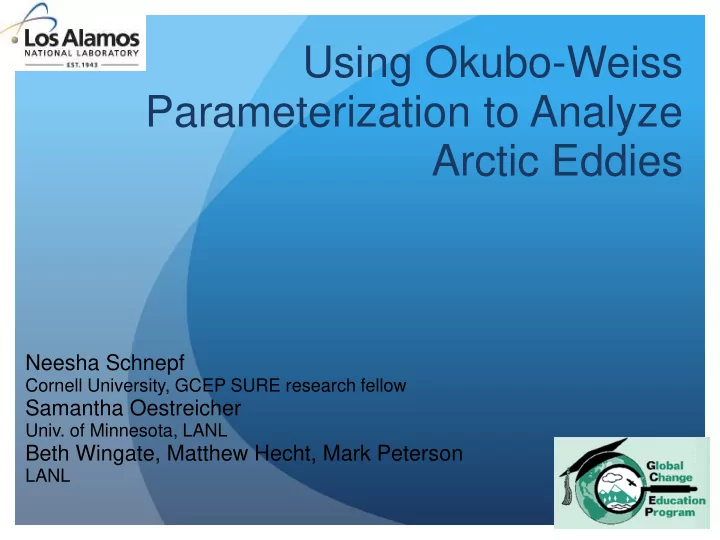

Using Okubo-Weiss Parameterization to Analyze Arctic Eddies Neesha Schnepf Cornell University, GCEP SURE research fellow Samantha Oestreicher Univ. of Minnesota, LANL Beth Wingate, Matthew Hecht, Mark Peterson LANL
Thank you! Todd Ringler, LANL Mathew Maltrude, LANL Xylar Asay-Davis, LANL Samantha Oestreicher (Univ. of Minnesota), Beth Wingate, Matthew Hecht, Mark Peterson, LANL Jeff Gaffney, Nancy Marley, Milton Constantin, Rose-Etta Cox, GCEP
General info. on ocean eddies • transport heat • mix the ocean • Nut rient s • S alinit y • kinetic energy (Stevens Institute of Technology)
General info. on ocean eddies mesoscale ocean eddies: T > t idal & inert ial T unlike atmospheric eddies: great er durat ion smaller scale slower (Stevens Institute of Technology)
(Jack Cook, Woods Hole Oceanographic Institution)
(Proshutinsky et al, 2009)
(Hunkins, 1974)
(Manley, Hunkins, 1985)
Data Communit y Climat e S yst em Model 4 (CCS M4) IPCC reports Parallel Ocean Program (POP) Resolution: .1 degree or 7-10 km
Identifying eddies -sea surface height -velocity and streamfunction -vorticity -Okubo-Weiss parameter (S am Oestreicher)
Velocity v u The x direction v v v v The y direction v v w u The z direction • EW, v & NS , u : reverse sign, magnitude increases away from center v w • u & v have same rotation sense • local velocity min at center (Nencioli, Dong, Dickey, Washburn, McWilliams, 2009)
(Nencioli, Dong, Dickey, Washburn, McWilliams, 2009)
(Nencioli, et al, 2010)
Vorticity Tendency t o swirl dx , d d dy , d ∇ = >0 is clockwise dz v v = ( u , v , w ) <0 is count er clockwise r v ∇ × v ω = v i j k d d d = dx dy dz u v w = dw dy − dv dz , du dz − dw dx , dv dx − du dy
Okubo-Weiss Parameter
(Sean Williams)
(Sean Williams)
(Sean Williams)
(Sean Williams)
(afsc.noaa.gov)
Recommend
More recommend